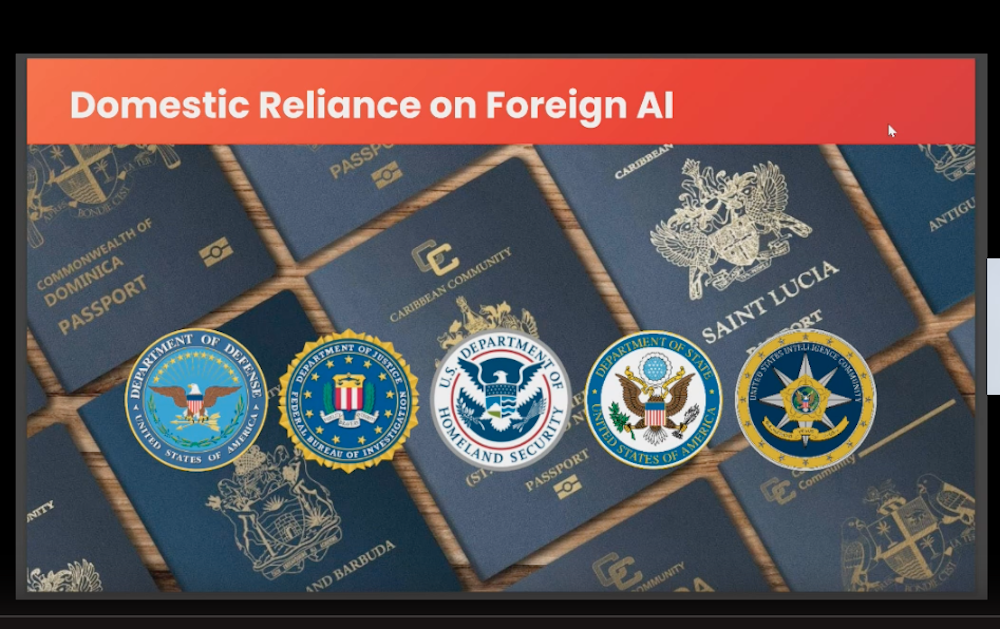By Autumn Shelton, WV Press Association
HUNTINGTON, W.Va. – Regulating artificial intelligence (AI) is something that West Virginia’s legislators must begin to consider, at least according to some experts.
On Monday, members of the interim Joint Standing Committee on the Judiciary heard from three experts on how AI is being used, and how it may be used in the future. All of the experts shared the same message: It is important to determine how AI should be legislated now before the technology grows.
The first expert to testify before the committee was West Virginia native Scott Swann, CEO of ROC.ai.

“It’s inevitable, at some point in time, that you need to start thinking about rule-making in this space,” Swann said, adding that world leaders have begun to think about this issue more, especially with the arrival of Chat GPT, an AI chatbot developed by OpenAI.
According to Swann, legislators should focus on the “origin of the artificial intelligence,” and “the damage it could do.”
To illustrate his point, Swann provided a worst-case scenario involving a self-driving car that has been programmed to stop at a stop sign. While the programming should have been written ethically for this function, he said that a person could write code which would cause the car to “accelerate and turn right causing an accident” if there was a “yellow sticky note on the stop sign.”
He said this type of “poison AI” leads to a black box where experts are not able to scan for unethical code to determine a program’s vulnerability.
“You really need to understand and trust the people who build your artificial intelligence,” Swann said.
Additionally, he discussed nationwide security concerns that should be addressed, like the creation of passports.
“We allow people to provide their own photos. What’s wrong with that?” Swann asked, before explaining that AI can take images of two different people and merge them together (called morphing) to create one image that resembles both people. This makes it hard for security officers to determine if a person is who they say they are via photo id.
“This is where it kinda gets a little bit concerning,” Swann continued. He told committee members to think about the state’s systems, like DMV services, when it comes to security concerns with AI.
He explained that countries like China and Russia are leading the way in AI development, and local leaders need to put “provisions” in place when considering where an AI program originates.
Even though there are concerns surrounding AI, Swann said there are many positives as well.
AI can provide weapons detection, license plate recognition and badgeless ID systems to create safer communities, especially in schools. Although he did note that leaders should be transparent with the public on how that data is used.
In response to a question from Sen. Jay Taylor, R-Taylor, who inquired if it is a good idea to implement a six-month pause in American AI development until the Three Laws of Robotics, developed by writer Isaac Asimov and discussed in the media, can be incorporated, Swann responded that those guardrails are most likely being broadly considered.
The next speaker, Ted Kwartler, Field CTO for Boston based DataRobot, discussed Chat GPT.
Kwartler said that Chat GPT technology is “now becoming mainstream.”
A Chat GPT user can type in any question, and get an AI response, Kwartler said. It will write scripts and email responses, generate photos and much more.
“We have to be aware and think ahead of this technology,” he stated, adding that the technology looks at pattern recognition and does have limitations. For example, it cannot predict the future. It can also be “tricked into bad behavior” – like giving a detailed response on how to break into a person’s house.
For regulation purposes, Kwartler said that “an adaptive policy framework” is needed, especially when it comes to issues such as a company using AI resume scanning to find their next employee, or to protect them from “inviting risk” into their organization.
“We have to think about how these things really do impact our society,” Kwartler said.
Del. Evan Hansen, D-Monongalia, stated that as he has learned more about Chat GPT, he has discovered that the program can write a “C-level” governmental proposal.
“It raises the question for me – a policy question, I guess, for us as legislators – is that okay to have state employees . . . use Chat GPT to write a proposal or write a report? Or, is it okay for vendors for the state of West Virginia to do that? Where is the line?”
Kwartler responded that this is something that should be discussed by all state leaders, noting that, “It’s gonna happen.”
“It’s going to get more sophisticated,” Swartler said of AI and programs like Chat GPT. “I think it’s for you to think about.”
The last speaker, Pooja Tolani, associate corporate counsel for Microsoft, told committee members that Microsoft is looking at various “guardrails” to create responsible AI.
She explained that responsible AI should have fairness, reliability and safety; privacy and security as a fundamental right; inclusiveness; transparency; and accountability.
“It’s a very exciting time to be in tech,” Tolani said. “At Microsoft, we believe that AI holds a lot of potential and promise, and that it will enhance virtually every sector of our economy in very meaningful ways.”
She concluded by stating that Microsoft will work with West Virginia’s leaders, if they wish, as they develop any potential AI regulation.







